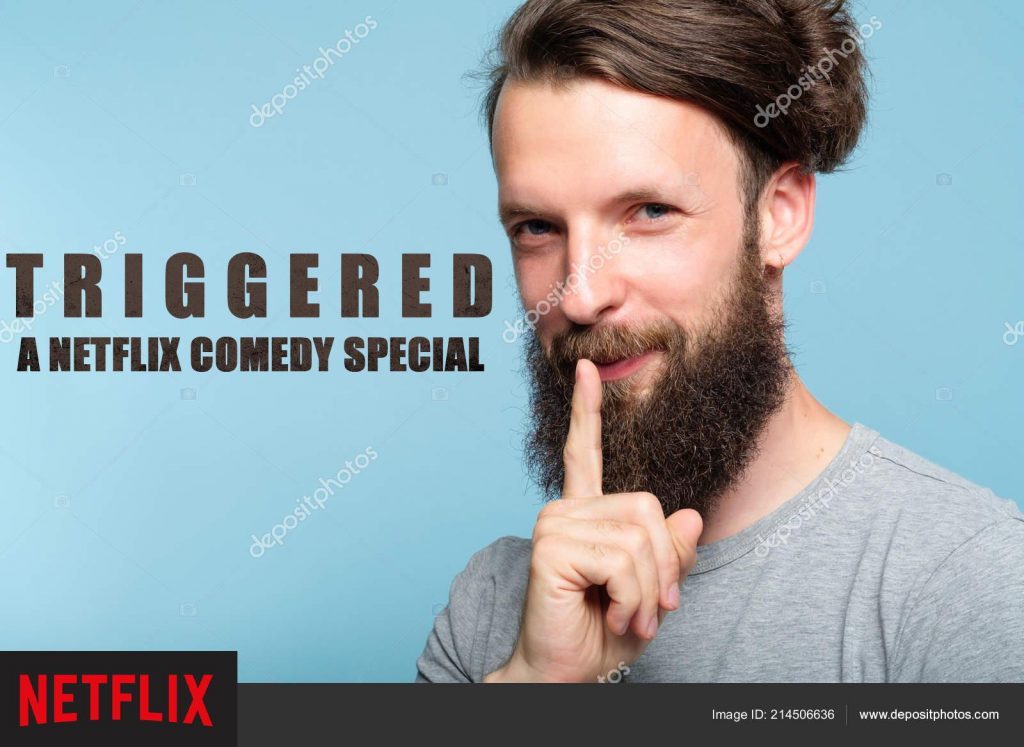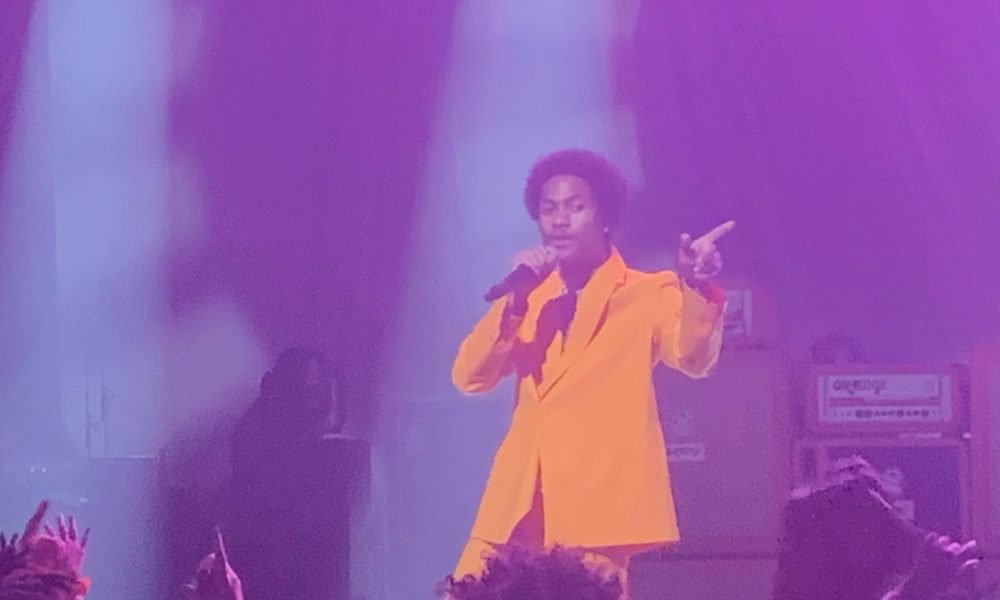Have you noticed something odd about Netflix’s comedy specials? A lot of the trailers either promote them as “Jokes of Mass Destruction! #TriggerWarning Snowflake!” or “No Balls, No Patriarchy, No Problem: A Female Comics Journey.” Even the specials themselves have a certain duality to them. Picture this, if you will: On one side, you’ve got loud towering men with aggressive and energetic deliveries. A bombastic stock music track plays in the background as he struts across the stage “telling it how it is” while leaving no survivors; and on the other, you have short-haired women with thick frame glasses offering humorous jokes and stories, but oftentimes also giving what is more comparable to a TED talk, wherein they mostly tell you about their lives, their trauma and their truths.
If you want a literal example of this, watch the trailer to Bill Burr’s latest special Paper Tiger, which makes an effort to include a jump cut of Burr talking about … what else? SAFE SPACES! HIPSTERS! MALE FEMINISTS! #METOO! Just as well, the trailer for Hannah Gadsby’s special Nanette shows her standing firmly on stage, talking about her life and struggles as a LGBT woman living in the Western world, with the few jokes that are sprinkled about relating to the socio-political issues that apply to her situation.
Advertising is about generating attention and profit. By highlighting the most controversial parts of their specials, Netflix aims to generate controversy, but also court certain audiences. Their actual methods are rather simple. According to Business Insider, “to build its U.S. social team of about 15 people, Netflix hired TV and movie buffs who were passionate about sci-fi or comedy, two key target areas for Netflix.” Netflix isn’t just hiring any old PR agents. They’ve reached out to the people on the inside: the fans. These people are presumably very online, and know more than anyone about what resonates with viewers, and what people will react to–– both positively and negatively.
Netflix seems to be making the most of the current political moment. Their marketing and contextual molding of their specials reflects a recognition of the temperature in the room. It’s all just another symptom of the culture wars, the ongoing battle between ideals and values, between older generations and younger generations, and so on. The cultural rift can even be noted in the striking difference in critic to audience reviews on sites such as Rotten Tomatoes, where Dave Chapelle’s Sticks & Stones currently has an abysmal, “rotten” 35% critics score and a whopping 99% audience rating. Gadsby’s Nanette is practically the inverse with a 100% critics score and a 22% audience score.
Lucky for Netflix, there certainly is not a shortage of things to market on. At least within the more underground, independent circuit of comedy there exists at least some division. In September, Saturday Night Live announced three new cast members. One of which was Shane Gillis, a comic from Pennsylvania who describes himself as “white trash”. Following the announcement, journalists quickly surfaced multiple clips of Gillis on various podcasts repeatedly using the word “chi*k” and doing an exaggerated Chinese accent. This quickly resulted in his firing. Meanwhile, podcasts in the New York comedy circuit include Legion of Skanks, the self-identifying “most offensive podcast in the world” hosted by Luis J. Gomez, Dave Smith and “Big Jay” Oakerson, and Cum Town, a similar podcast hosted by Nick Mullen, Adam Friedland and Stavros Halkias. Their comedic stylings feature everything from ethnic accent impressions to jokes aimed at those with disabilities. That aside, the thing they both have in common is that they have garnered polarizing online followings for their irreverent, politically incorrect humor and equal opportunity offender attitudes. Both have faced criticism and pushback from a number of writers and commentators, such as Sadie Doyle. Legion of Skanks has faced similar criticism, but despite it has continued to grow in popularity, even launching its own festival that, just this past year, welcomed disgraced comedian Louis C.K. to a standing ovation, with many fellow comics, including writer/comedian Kath Barbadoro, criticising it as not only tone-deaf, but also a workplace safety issue.
The question remains, though. How did things get to this point, and why? Are there any answers to be found?
In the aftermath of Trump’s presidency, we have seen an uptick in commentary regarding the responsibility and role of comedy in society, as well as a larger number of controversies surrounding comedians. In August, 2017, The Establishment, a blog focusing on feminism and social justice, published an essay titled “How ‘South Park’ Helped Empower The ‘Alt-Right’”, which argued that the animated series in some way lead to the creation of the far-right movement. In March of that same year, The Atlantic ran a cover-story on Alec Baldwin, with an accompanying caption that read “Can Satire Save The Republic?” Articles like these place figures such as Alec Baldwin and Samantha Bee on a pedestal, framing them as key figures in the #Resistance. The SNL-Shane Gillis situation has been propelled into a culturally relevant topic thanks to articles like The Hollywood Reporter’s “Comedy’s Civil War: How an ‘SNL’ Firing Exposed a Growing Rift in Stand-Up”, to the point where even presidential candidate Andrew Yang took to twitter to give his two cents.
There are a couple of arguments used to justify this emphasized importance. One is simple: people should be careful about what they say, especially those with a larger platform. Raphael Bob-Waksberg is the creator of the Netflix animated series “Bojack Horseman”. In an interview with VICE, Bob-Waksberg was asked about the value of political correctness and mindfulness in comedy. He responded:
“I think most people who argue for what you might call political correctness, are not actually arguing for censorship. They’re arguing for self-control and self-restraint. They’re arguing for people to be conscious of the power they have, right? And I believe that I have a lot of power, as someone making popular entertainment. I do think we have to be careful about the art we put out. We want to make the argument that our art has power so we can’t then also say that it has no effect over people, these people are adults who can make their own decisions. I think the art we make influences people, and I think with that power comes great responsibility, to quote Spiderman.”
This argument is not invalid. Everything is about time and place, and humor is no exception. “I don’t necessarily think anything is off limits,” Bob-Waksberg continues in the interview, “but you have to know who your audience is and know who you’re talking to and what kind of jokes you’re making.” Aside from that, like anything else, the first Amendment can be abused. Just because you can say something does not mean you necessarily should. This extends well beyond jokes. This can be seen as represented through platforms like 4chan 8chan, where people are virtually unregulated and are given carte blanche to say whatever they want, no matter how inappropriate, offensive or even harmful what they say actually is.
One of the more tragic and radical examples of this would be Connor Betts, the 24 year old white male who posted a racially charged manifesto on 8chan before murdering 10 people, including his sister, in the streets of Dayton, Ohio this past August. Tying this back to humor, Betts was the frontman for a band called Menstrual Munchies, a band that prided itself on “ironically” preaching violent, crude lyrics about raping and abusing women. “Whereas I saw it as a joke — like, ‘Let’s play this and we’ll shock some people,’ and then the people that we know laugh — he didn’t see it as a joke,” says Jesse Creekbaum, his friend and bandmate, in an interview with VICE. “He was like, ‘Fuck, yeah. We’re gonna do this.’ It’s like, Jesus Christ, how much of this was like real life for him?” This sort of dissociation with reality is sometimes referred to as irony poisoning. While other factors obviously played larger roles in Betts’ actions–– such as mental health and lax gun laws–– the correlation is hard to ignore. We can sit back and just say that the things he posted were a joke, but when the relationship between art and violence becomes near-direct, then it is no longer just art or just a joke or just words. It becomes a weapon. This is also noticeable with The Proud Boys, a group started by Libertarian commentator and VICE co-founder Gavin McInnes. After a supposed “joke” gone haywire, McInnes eventually made a call for violence against people on the left end of politics. The result was the group being placed on an FBI watchlist, and McInnes conveniently distancing himself from the movement all together.
The other argument is that there is a thin-line between irony-bro edgelord and genuine hate monger, and the line is so thin that audiences cannot tell the difference. Take, for example, Deadspin’s feature on Barstool Sports’ PFTCommenter. The piece accuses PFTCommenter, a character parodying a loud mouthed, obnoxious, sexist, and overzealous sports bro, of providing Barstool and its founder Dave Portnoy a shield from criticism that they unironically embody those very characteristics, claiming that:
“…The real value of PFT Commenter’s shtick imitating a dog-whistling, sexist, message-board idiot is tricking people—or at least certain people, whose opinions matter very much—into thinking that Barstool Sports is not in fact dominated by racist, neanderthal bullies who harass women online, videotape each other in the shower, and call underage girls hot, repeatedly, but is in fact some high-concept gag. This isn’t the thing itself, PFT Commenter’s presence proclaims, in the face of a mountain of evidence that it is. But we’re all in on the joke.”
In covering the Shane Gillis-SNL incident, Seth Simons, a comedy critic and journalist, wrote on his newsletter, “Good Stuff” that “one of the strangest parts […] has been the widespread refusal by comedians and fans to acknowledge that comics mean what they say. But they do. It’s very simple. Shane Gillis said all the cruel and ignorant things he said because he believes them. That’s who he is. This is true on the larger scale too.”
Regarding the same issue, Simons would later go on to write in an essay for Slate:
“In reality, unserious speech has the same power as serious speech. A friend told me last week that since Dave Chappelle dismissively deployed the term “alphabet people” in Sticks and Stones, he’s observed an uptick in its use as a derisive reference for the LGBTQ community—and indeed, an unscientific Twitter search for the phrase before and after Aug. 26 shows a spike. Does that mean Chappelle should not joke about whatever he wants, for fear he might mainstream a new slur? No, but it means that people are listening, and if Chappelle doesn’t care about that, we should.”
It’s an interesting argument, to give it credit. But the problem with it is that it ignores one of the core elements of comedy, and speech in general: context. By this logic, irony does not exist, and everyone genuinely means everything they say. If someone tells their friend to “break a leg” before performing for an audience, then they genuinely want to see that person get their legs broken. When it comes to reading into jokes or satire or anything for that matter, the key elements to look at are intent plus context. What is the person trying to say? What are they intending? How is the execution? What is the outcome?
Being a comedian is an occupation, and it is one that involves taking risks, and trying out different ideas. Whether or not those ideas work is not always discernible, though. “Hate speech is whatever you want it to be. It has no specific definition,” writes Lou Perez, the head writer and executive producer for the political satire/commentary website We The Internet TV, in an op-ed for Spiked magazine. “The term has become a catch-all for any speech that anyone hates, whether it’s virulent white nationalism or reasoned social commentary defending civil liberties.” And that’s the reason why it’s near impossible to eliminate “problematic” material from the culture at large: what is hurtful to some may not be to others.
The risk of being offended is an unfortunate byproduct of the trials and errors of comedy, but so be it. To be harassed or threatened by someone is one thing, and as said before, if somebody is actively calling for violence then said person should be called out and dealt with, but to just be exposed to offensive jokes or unpopular opinions is fairly minor in comparison to actual violence or oppression. Nobody is forcing anyone to hear them. Nobody is required to listen to Shane Gillis or Cum Town, nor is anybody being physically attacked by their hosts and fanbase. People choose to listen to them. As with everything else in life, consumption comes with consequences and should be done at one’s own risk.
It is also worth analyzing the true influence of comedy and satire on it’s own. In March, 2018, a colleague of mine, Joe Amendola, wrote an essay titled “Is Trump Funny? On the Limits of Political Satire in a World Where Reality is a Horrifying Joke.” The piece acts as a review of the Showtime animated series Our Cartoon President, a satire of Trump and the administration. Towards the middle of it, while discussing the impact of political satire, he writes “…did The Daily Show do anything? Did it stop the war in Iraq that it was so ardently against? Or slow down the rise of the right-wing Tea Party political movement, something it skewered over and over again? As of today, America doesn’t have any less of an outsized military presence around the world, and the Tea Party movement has had incredible electoral success and fundamentally changed politics.”
“Jon Stewart on his own has done more for humanity than The Daily Show as a whole,” tweets comedian Ian Fidance, referring to Stewarts efforts to get 9/11 First Responders better health benefits. “Do what you can and make a difference on your own but tricking yourself into thinking ‘comedy’ cares or is important for social change is dumb [in my opinion].”
Taking this all into consideration, is it really worth being actively mad at podcasts? To do so feels at least somewhat comparable to getting mad at Slayer in the ’80s or Marilyn Manson in the ‘90s. No, the material doesn’t always land, and yes, arguably speaking, they can be offensive and punch too hard — but in the long run, it’s all an act. It’s the reason that articles like the aforementioned PFTCommenter take-down come off as out of touch and misguided. “There’s no shadowy conspiracy to ‘shield’ anything,” says Keith Markovich, Barstool Sports’ editor-in-chief, in a tweet responding to the article. “Some things are just FUNNY. People LIKE laughing.”
And that might be the best way to put it: some things are just funny, and some people just want to laugh. There isn’t always a critical lense to put over something, and there isn’t always a think piece-styled reason for something being said. Sometimes people just enjoy something for enjoyments sake. “We go to work, we go out in public, and we have to act proper and professional,” says Matt Saincome, co-founder and president of the satire website The Hard Times, in an interview over the phone. “A lot of people sometimes turn to comedy and go to shows because they want to escape that and hear someone say things we can’t.”
On the flip side of all this, if you feel the need to spend time being mad at offensive material –– and some will because we’re human and we naturally like to rant and rave about things –– then at the very least put that energy into people with actual, genuine political messages and larger audiences. Go after people like Steven Crowder, who sells shirts with the slogan “socialism is for fags” printed on them. Go off on Owen Benjamin, who regularly launches aggression-fueled rants against fellow comedians for criticising and disagreeing with him, and who consistently unironically uses slurs like the n-word and homophobic analogies ad nauseum to drive his points home. Criticize Gavin McInnes. People like this mean what they say, actually promote some sort of harassment and violence, and what they have to say is genuinely hateful and, frankly, sucks.
In a perfect world, people would worry about themselves. If they did not like something, they would simply not consume it, and the ones who do would just enjoy it and leave it at that. It’s certainly how I try to go about life. But as a friend of mine once said, “ideal ain’t real”. That said, there is no real answer or resolution to this aspect of the culture wars. It is an ongoing dialogue that will ebb and flow as history moves forward. And that’s fine, I guess. Everyone is going to have their own agendas. In that case, the better way to look at things, as I argued before, is to base them on time and place. Where is something being said and when? What is the larger outcome? In the meantime, as long as people keep debating, and as long as people keep playing into it, companies will continue to market on it. Netflix refers to their comedy section as “Netflix is a Joke,” but as far as overall business goes, it’s anything but. They have put out over a hundred specials over the course of two years, and many of them have either gone on to acclaim or sparked some degree of socio-political discourse. As long as they continue to churn out a consistent product, people will flock to it; and considering the way they market it, people, whether they love or hate it, will watch.




Comments are closed.